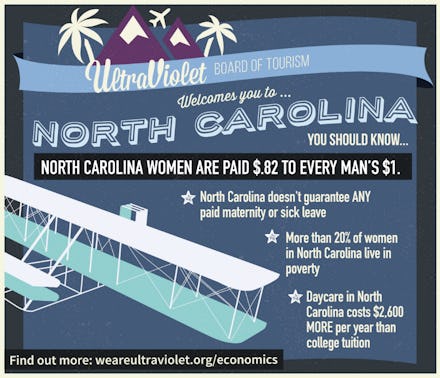U.S. Airports Won't Show You These Women’s Rights Ads, So We Will

U.S. airports are littered with advertisements, but that hasn't stopped them from refusing to run displays featuring basic information about women's rights.
UltraViolet, an advocacy group aimed at fighting sexism and expanding women's rights, recently attempted to launch such an ad campaign in several airports. They focused on states with both booming tourist industries and histories of economic inequality between the sexes, like Texas, Louisiana and North Carolina.
When the targeted airports got wind of the ads, however, they flat-out refused to run them.
Image Credit: UltraViolet
"We have a policy in which we do not accept political advertising at the airport, and so the ad was declined on those merits," Angie Tabor, manager of communications and media relations at the Columbus, Ohio, airport, told ThinkProgress.
While it's true that the campaign's goal is political -- "The goal is to shame and pressure candidates with industries that rely on tourism to make them champions for these causes," Karin Roland, UltraViolent campaign director, told ThinkProgress -- the advertisements they want to use are not.
They're just statements of fact. These displays aren't trumpeting the merits of a candidate for office or disparaging an ideological viewpoint. "It's just reality for women," Roland said.
Image Credit: UltraViolet
The facts come from trustworthy sources (which you check here by clicking through each advertisement). Technically, the signs don't even express an opinion -- they merely ask the viewer to visit their website to find out more.
These states definitely do have a problem. In Kentucky, for example, 74% of women live in counties without abortion providers, according to the Guttmacher Institute. Health insurance providers also can't cover abortions except when the mother's life is in danger.
As the ads show, all of these states have issues with equal pay. Nevada is one of the better ones -- their gap is $0.85 to the dollar -- but the worst is Louisiana, where women earn just $0.67 to the dollar. Louisiana also lags behind in political representation, with just 12.5% of congressional seats held by women.
Image Credit: UltraViolet
Do the airports have a case? Unfortunately, it appears that they're in the clear. Many airports -- including those in Charlotte and Louisville, which refused to run the ads -- are operated by state and local governments. This, as an astute ThinkProgress commenter pointed out, could interfere with the First Amendment's free speech protection.
However, because the ads are not being used to sell something, the airports are well within their rights to turn them away. If UltraViolet's ads were being used for commercial purposes -- for example, if they urged viewers to buy organization t-shirts or pins -- then the airports would have been in the wrong. But since they're merely making a statement, they can be rejected.
At least one person is fine with that. Rep. Steve Stivers (R-Ohio) told Columbus Business First that he found the campaign "offensive." He added that in his office, "women make more on average than men."
Image Credit: UltraViolet
This hasn't stopped UltraViolet, however. And nor should it. The ads are vitally important to increasing awareness for the realities women face every day.
The group has since started a petition to tell the airports to stop the censorship. And, according to Cleveland.com, they've bought billboard space near Dayton and Cleveland to present the ads the airports refused to.
"We'll make sure we get this message out whether airports want to accept these ads or not," Roland said.